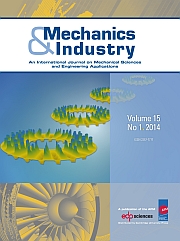Crossref Citations
This article has been cited by the following publications. This list is generated based on data provided by
Crossref.
Mustafa, Ashafi’e
Abdollah, Mohd Fadzli Bin
Shuhimi, Fairuz Fazillah
Ismail, Nurhidayah
Amiruddin, Hilmi
and
Umehara, Noritsugu
2015.
Selection and verification of kenaf fibres as an alternative friction material using Weighted Decision Matrix method.
Materials & Design,
Vol. 67,
Issue. ,
p.
577.
Li, Wenbin
Huang, Jianfeng
Fei, Jie
Cao, Liyun
Yao, Chunyan
and
Wang, Wenjing
2015.
A statistical model for evaluating the tribological properties of paper-based friction materials.
Tribology International,
Vol. 92,
Issue. ,
p.
418.
Renzi, Cristina
Leali, Francesco
and
Di Angelo, Luca
2017.
A review on decision-making methods in engineering design for the automotive industry.
Journal of Engineering Design,
Vol. 28,
Issue. 2,
p.
118.
Shinde, Dinesh
Mistry, Kishore N.
Jhavar, Suyog
and
Pathak, Sunil
2018.
A Review on Non-Asbestos Friction Materials: Material Composition and Manufacturing.
Advanced Materials Research,
Vol. 1150,
Issue. ,
p.
22.
Mat Tahir, Noor Ayuma
Abdollah, Mohd Fadzli Bin
Tamaldin, Noreffendy
Amiruddin, Hilmi
Mohamad Zin, Mohd Rody Bin
and
Liza, S.
2020.
Tribological performance of the graphene synthesized from fruit cover plastic waste and oil palm fiber using a CVD method.
Industrial Lubrication and Tribology,
Vol. 72,
Issue. 6,
p.
771.
Renzi, Cristina
Di Angelo, Luca
and
Leali, Francesco
2020.
Design Tools and Methods in Industrial Engineering.
p.
373.
Abdollah, Mohd Fadzli Bin
Amiruddin, Hilmi
and
Nordin, Mohamad Jabbar
2021.
Effect of fibre length and composition on the tribological attributes of oil palm fibre polymeric composite: organic brake friction material.
Industrial Lubrication and Tribology,
Vol. 73,
Issue. 4,
p.
614.
Shaharuzaman, M.A.
Sapuan, S.M.
and
Mansor, Muhd Ridzuan
2021.
Design for Sustainability.
p.
57.
Srin, K. S.
Ramkumar, J.
and
Bathe, Ravi
2022.
Material Selection for Ultrashort Pulsed Laser Textured Self-cleaning Surfaces.
Journal of The Institution of Engineers (India): Series C,
Vol. 103,
Issue. 4,
p.
867.
Melo de Lima, Luiza R.
Dias, Ana C.
Trindade, Tito
and
Oliveira, José M.
2023.
A comparative life cycle assessment of graphene nanoplatelets- and glass fibre-reinforced poly(propylene) composites for automotive applications.
Science of The Total Environment,
Vol. 871,
Issue. ,
p.
162140.
Yilmaz, Galip
Gerdan, Zeynep
and
Çolak, Murat
2024.
Exploring alternative polymer materials for joint liners: a software-guided material selection.
Engineering Research Express,
Vol. 6,
Issue. 4,
p.
045539.


